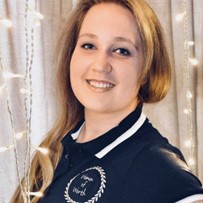Michelle Marais -Winner- Third runner up - General 2023 ,
Hollard Insure and Farmingportal.co.za and Agri News Net - Young Agri Writers awards
Bridging the gap between Investors, Executors and the Sustainability Challenge for Developing Smallholder Farmers
Training and empowering smallholder farmers in developing countries has become a focal point of discussion across various platforms in recent years. While there is no universally agreed-upon definition for the term "smallholder farmer" in academic literature, it generally refers to individuals who cultivate small plots of land and/or raise limited numbers of livestock in rural areas.
The training and development of smallholder farmers align with the Sustainable Development Goals (SDGs), which have played a significant role in driving initiatives aimed at improving the livelihoods of smallholder farmers in developing countries. These initiatives are often spearheaded by large, commercially successful companies or charitable foundations based in developed countries. Many corporate partners are actively engaged in such initiatives as part of their corporate social responsibility efforts, aiming to build goodwill and make a positive impact on local communities. Some corporate investors, like the Bayer Food Chain Partnership initiative, emphasize the importance of achieving sustainable commercial returns in their efforts aimed at smallholder farmers to ensure long-term sustainability beyond initial funding. Unfortunately, many investments in projects aimed at developing smallholder farmers in developing countries fail once initial funding stops. The collaboration of private partners has shown success in some cases. Achieving economic sustainability is pivotal to achieve long-term commitment and development of local agribusinesses and farmers alike.
The challenge of economic sustainability for agribusinesses focusing on developing smallholder farmers and marketing products or services tailored to their unique needs, is its immense capital and resource requirement.
The IFAMA Student Case Competition brought together students from around the world to brainstorm potential solutions for achieving sustainability in agricultural investment efforts targeting smallholder farmers. As the sole contestant from a developing country in my category, I engaged with young professionals from venture capital firms, global corporations, and consultants from the Big Four. I found their approach to problem-solving intriguing and learned valuable skills in developing frameworks and presenting them to industry specialists. These are the people who provide financial support for projects aimed at smallholder farmers in developing countries. They make influential decisions. However, they have little to no experience or exposure to the realities faced by smallholder farmers and agribusinesses in developing countries.
I challenged many of their proposed solutions, not to discourage them but to make them aware of the complex and multifaceted challenges. Issues such as inadequate access to healthcare and sanitation, low education levels, poor infrastructure, limited access to resources, and myriad other challenges have tangible, real-life implications when rolling out developmental projects in these markets. These challenges are not merely academic, theoretical, or lists generated on Google and ChatGPT; they profoundly affect the daily lives and prospects of individuals and communities, as well as the business strategies within these markets. These challenges should inform tailored approaches within these markets to achieve long-term, commercially viable development and environmental, economic and social sustainability.
As I started to share my stories from training smallholder farmers and my experience working on projects they have only read about, the ideas and solutions suddenly evolved. We entered the competition competing, but quickly realised that we could not achieve the solution independently. They have the resources; I happen to be street wise in Africa. They need me for success just as much as I need them.
I am from a generation that is putting an immense amount of energy into “bridging the gap” between Africa and the developed world, to the extent that I can’t host a high-school reunion. There are simply not enough of my peers left in the country. I was one of the many who left on the seemingly one-way road to Europe. I happen to be one of very few who came back. I discovered that this bridge is a two-way street.
Africa holds so much potential, lots of which sits in the hands of our estimated 33 million smallholder farmers. The commercial and sustainability challenge being that the ROI is low, slow, resource intensive, and high risk. It is somewhat easier to justify allocation of resources to “charity” with no expected ROI and lots of goodwill. However, to achieve long-term development amongst smallholder farmers and local agribusinesses we need to bridge the gap between our investors and our executors. Low and slow ROI potentially has a higher long-term net positive effect in this mission of developing smallholder farmers, and the economies in which they function. Starting with me bringing some friends from Auckland and New York over the bridge to a village like Mityana or ThabaNchu.
Michelle Marais is an agricultural economist and has always been passionate about smallholder farmers’ role in developing Africa. She has travelled around the world sharing her ideas and knowledge about agricultural development and the role of smallholder farmers. She is an active and inviting member of IFAMA. Michelle is a Project Coordinator at Urban Farmer where she and her team are providing training to smallholder farmers across Africa alongside their innovative smallholder animal feed solution. Michelle is excited about the potential of the agricultural sector of Africa and excited to be on a team embarking on the task of producing affordable protein in Africa – for Africa.














